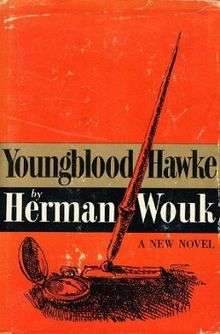Youngblood Hawke
 First edition | |
| Author | Herman Wouk |
|---|---|
| Country | USA |
| Language | English |
| Published | Doubleday, 1962 |
| Media type | Book |
| Pages | 783 |
| ISBN | 9780385029742 |
| OCLC | 1408992 |
Youngblood Hawke is a 1962[1] novel by American writer Herman Wouk[2] about the rise and fall of a young writer. It is based on the life of Thomas Wolfe.[3]
Plot summary
Youngblood Hawke is the story of Arthur Youngblood Hawke, an ex-Navy man who comes to New York to publish his first great novel, Alms for Oblivion. Originally a poor young man from Hovey, Kentucky, Arthur is the son of a dead literary minded man and a mother who sniffs out her own fortune via the scalping of family relations in the coal mining business. Hawke's mastery of the written word and his hunt for wealth come from this mating.
While publishing his first novel, he falls in with a married woman, Frieda Winter, with whom he maintains an emotionally tumultuous affair for far too long. Meanwhile, in the course of his writing career and his affair, he carries a torch for Jeanne Green, his editor. Over continents and over a surprisingly short number of years, Arthur Hawke feverishly pens five novels.
His fame carries with it great wealth but Arthur has a weakness for building wealth fast. He gets involved with Scott Hoag, a builder from his own town, who gives him the opportunity to participate in real estate development such as suburban shopping centers. In a few years, Arthur overextends himself and becomes seriously in debt.
In the end, he works himself to death between the money he owes; jealousy over Jeanne, the love of his life, who married once to spite him; and the tragedy of Frieda Winter's son's suicide for which Hawke feels responsible. A head trauma from his days of coal trucking in Hovey also comes into play. Surrounding and soon after his death, Youngblood Hawke achieves the success and status that he had sought while alive.
The story was serialized in McCalls magazine from March to July 1962.
Film adaptation
Warner Brothers adapted the novel into a black-and-white film production in 1964; it featured a musical score composed by longtime Warners staff composer Max Steiner. Released on November 4, 1964, the film had a running time of 137 minutes. Reportedly to save costs, the film was shot in black and white at a time when most major productions were made in color. It was directed by Delmer Daves from a screenplay by Wouk and Daves.[4]
References
- ↑ Lagassé, ed. by Paul (September 2013). "Herman Wouk" in Columbia Electronic Encyclopedia, 6th Edition (6. ed.). [New York]: Columbia Univ. Press u.a. ISBN 9780787650155.
- ↑ Rogers, Michael (15 July 2004). "Aurora Dawn/City Boy/Inside Outside/Youngblood Hawke". Library Journal. 129 (12): 127.
- ↑ Kauffmann, Stanley (11 June 1962). "Look Backward, Angel". New Republic. 146 (24): 24–25.
- ↑ http://www.tcm.com/tcmdb/title/16086/Youngblood-Hawke/articles.html
